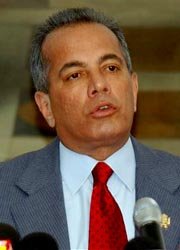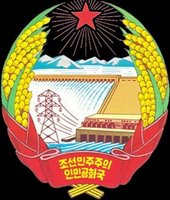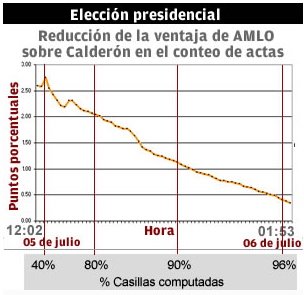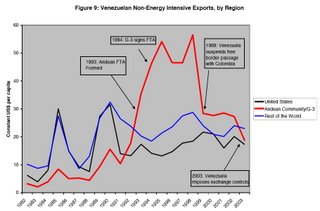July 8, 2006
Extra! Extra! Sanity breaks out in the comments section!
An event rare enough to merit a post of its own: Yesterday, at about 1:00 p.m., a debate broke out in the comments section that was on topic, fun, sophisticated, enlightening and cordial. Feathers, Katy, Rafael, and Amieres: you don't know how happy you made me!
July 7, 2006
Rosales's Quirky Campaign Launch - And Teo's Obstructionism
 After months of sitting on the fence, Zulia's neo-adeco governor Manuel Rosales has finally made it clear that he's running for president - in the weirdest way possible, by announcing he is willing to participate in an oppo primary. What kind of a campaign launch is that?
After months of sitting on the fence, Zulia's neo-adeco governor Manuel Rosales has finally made it clear that he's running for president - in the weirdest way possible, by announcing he is willing to participate in an oppo primary. What kind of a campaign launch is that? Though Borges, Rosales and six marginal candidates have signed on, it's still unclear whether there will be a primary on August 13th, because Teodoro Petkoff is still dithering. Teo's made it clear in various ways that he's not for a primary, and would prefer a complicated polling solution to determine the candidate. Not surprising, cuz the guy is far behind in the polls.
Sumate's position, that they will only organize a primary if all main oppo candidates participate, effectively gives any one of them a veto over the whole thing. Is this really sensible?
July 6, 2006
Common Sense Meltdown Chronicles: The Chavez-North Korea Axis
 In the wake of worldwide condemnation for North Korea's missile tests, Chávez's timing for a Pyongyang getaway is looking especially ill-judged. North Korea's move, which is being interpreted as a slap in the face even for its only ally, China, has placed the hermit totalitarian prison-state even farther beyond the pale than it already was.
In the wake of worldwide condemnation for North Korea's missile tests, Chávez's timing for a Pyongyang getaway is looking especially ill-judged. North Korea's move, which is being interpreted as a slap in the face even for its only ally, China, has placed the hermit totalitarian prison-state even farther beyond the pale than it already was. Hell, even Argentina was horrified.
Right on cue, in step the chavistas to stick up for Pyongyang's right to develop missile technology - while, moronically, asserting that the government doesn't have an official position yet. Hm.
With Caracas now serving as the site for meetings of the Board of Directors of the International Institute of the Juche Idea and Venezuela hosting one of the very few North Korean embassies abroad, it's hard to disagree with the US State Department's judgement that Chávez is an outlier on this issue.
Chávez's ongoing flirtations with the Ultimate Rogue State merely underlines a point that should be clear to anyone who's been paying attention: the guy never met a tyranny he didn't like. But does he really understand how very, very far from diplomatically correct it is to cozy up to a state like this?
Of course, my comments section has already served as the site of impassioned defenses of the use of children as mine-clearing equipment in Iran - following Chávez's coddling up to that regime - so how long can it be until someone turns up to explain that no, really, North Korea is really a nice place?
Personally, I can't wait for him to go so I can put the picture on my right-hand column.
Would an AMLO win really favor Chavez?
Say chavistoid populist Andrés Manuel López Obrador somehow gets the Mexican vote count overturned and wins the Mexican presidency...would that really favor Chávez?
Personally, I have doubts. Chávez is happy to have fellow travellers elected in smaller, weaker, poorer countries like Bolivia, Peru and Nicaragua, places where his oil dollars carry enough weight to dictate policies. But would AMLO really play second fiddle to Chávez? Would a larger, richer, stronger country really fall into line behind our little Napoleon's fantasies of hemispheric leadership? I really doubt it.
More likely, AMLO would end up staking a challenge to Chávez's ambitions for leadership of the hemispheric left. And that's the last thing El Comandante wants.
Personally, I have doubts. Chávez is happy to have fellow travellers elected in smaller, weaker, poorer countries like Bolivia, Peru and Nicaragua, places where his oil dollars carry enough weight to dictate policies. But would AMLO really play second fiddle to Chávez? Would a larger, richer, stronger country really fall into line behind our little Napoleon's fantasies of hemispheric leadership? I really doubt it.
More likely, AMLO would end up staking a challenge to Chávez's ambitions for leadership of the hemispheric left. And that's the last thing El Comandante wants.
Could the government be lying about illiteracy?
Katy says:
"Just to cite some important examples, our country had the honour in 2005 of having been declared officially by UNESCO as an illiteracy-free territory." Mary Pili Hernández, Venezuela's Vice-Minister for Foreign Affairs
"UNESCO has not endorsed or made any statement to the effect that Venezuela is free of illiteracy." Sue Williams, UNESCO's Chief of Section of Bureau of Public Information, Paris.
Source: Vcrisis - the encore.
"Just to cite some important examples, our country had the honour in 2005 of having been declared officially by UNESCO as an illiteracy-free territory." Mary Pili Hernández, Venezuela's Vice-Minister for Foreign Affairs
"UNESCO has not endorsed or made any statement to the effect that Venezuela is free of illiteracy." Sue Williams, UNESCO's Chief of Section of Bureau of Public Information, Paris.
Source: Vcrisis - the encore.
Update: Calderón Pulls Ahead

At 5:07, Ccs time, Calderón takes the lead...
Click here for minute-by-minute updates from the Mexican El Universal.
Mexico's Nail-Biter
Nothing to be done in Mexico but nibble at your nails...

At 4:47 a.m. (Caracas time), with 97.6% of actas recorded, AMLO is ahead by 0.02%...but results are changing all the time and the latest results coming in are from the pro-Calderón north, so keep checking for updates...


At 4:47 a.m. (Caracas time), with 97.6% of actas recorded, AMLO is ahead by 0.02%...but results are changing all the time and the latest results coming in are from the pro-Calderón north, so keep checking for updates...

July 4, 2006
Chavez's trade policy in historical perspective...
In a Working Paper, presented at a recent conference on Venezuela's disastrous economic performance since the late 70s, Ricardo Hausmann and Francisco Rodríguez put forward a sophisticated explanation for the collapse.
At the center of their interpretation is the argument that the absence of an alternative export industry left Venezuela badly exposed to energy market shocks. Unlike countries like Mexico, Indonesia and Malaysia that managed to diversify their export baskets, Venezuela's nearly complete specialization in energy (and energy-related) exports amplified the impact of sporadic oil price downturns.
From this point of view, policies that help diversify Venezuela's export basket constitute a safety net against future downturns. And few policies had achieved that goal as well as signing regional free trade agreements like the Andean Community and the G3 deal with Mexico and Colombia. As this chart shows, from the early 1990s Venezuela's non-Energy Intensive producers finally started to gain a foothold, largely thanks to those deals:

Click to enlarge. Taken from Hausmann and Rodríguez, Why did Venezuelan growth collapse?, Page 50.
As the chart also shows, since the very start of the Chavez era, misguided trade policy decisions have seriously undermined the value of those agreements. All of which we should keep in mind as we track the debate over Venezuela's exit from the G3 and the Andean Community, and our entry into the barely-functioning Mercosur.
First off, Venezuela's Andean and G3 trade was largely concentrated on its largest and most "natural" trade partner: Colombia. Tearing down our trade agreements with Colombia to enter a deal with countries whose economic center of gravity is thousands of miles away makes no sense.
Second of all, while it's clearly a bad idea to formally deny Venezuelan exporters their privileged access to the Colombian market, we need to keep the decision in perspective: the real economic damage has already been done, through things like the introduction of transshipment requirements in 1999 and exchange controls in 2003. Formally exiting the deals merely makes it official.
At the center of their interpretation is the argument that the absence of an alternative export industry left Venezuela badly exposed to energy market shocks. Unlike countries like Mexico, Indonesia and Malaysia that managed to diversify their export baskets, Venezuela's nearly complete specialization in energy (and energy-related) exports amplified the impact of sporadic oil price downturns.
From this point of view, policies that help diversify Venezuela's export basket constitute a safety net against future downturns. And few policies had achieved that goal as well as signing regional free trade agreements like the Andean Community and the G3 deal with Mexico and Colombia. As this chart shows, from the early 1990s Venezuela's non-Energy Intensive producers finally started to gain a foothold, largely thanks to those deals:

As the chart also shows, since the very start of the Chavez era, misguided trade policy decisions have seriously undermined the value of those agreements. All of which we should keep in mind as we track the debate over Venezuela's exit from the G3 and the Andean Community, and our entry into the barely-functioning Mercosur.
First off, Venezuela's Andean and G3 trade was largely concentrated on its largest and most "natural" trade partner: Colombia. Tearing down our trade agreements with Colombia to enter a deal with countries whose economic center of gravity is thousands of miles away makes no sense.
Second of all, while it's clearly a bad idea to formally deny Venezuelan exporters their privileged access to the Colombian market, we need to keep the decision in perspective: the real economic damage has already been done, through things like the introduction of transshipment requirements in 1999 and exchange controls in 2003. Formally exiting the deals merely makes it official.
The Chavez Effect: Two for Two
Well, the election in Mexico is achingly close, and the legal challenges will surely mount. One thing we can say for sure, though: Andrés Manuel López Obrador's comfortable lead, which lasted for two years prior to the election, vanished the second Calderón managed to link him to Chávez.
Just like in Perú, even the perception of Chavophilia has proven an electoral poison pill in Mexico.
Imagine how different the hemispheric picture would look without the Chavez Effect. With Ollanta and AMLO in power, all the tooth-gnashing about an authoritarian backslide in the hemisphere would have some real meat on its bones. As it stands, Hugo's club is a problem for Bolivia, Venezuela and Cuba - not for the hemisphere.
Just like in Perú, even the perception of Chavophilia has proven an electoral poison pill in Mexico.
Imagine how different the hemispheric picture would look without the Chavez Effect. With Ollanta and AMLO in power, all the tooth-gnashing about an authoritarian backslide in the hemisphere would have some real meat on its bones. As it stands, Hugo's club is a problem for Bolivia, Venezuela and Cuba - not for the hemisphere.
July 3, 2006
Last last-ditch effort to save WTO talks fails - attention now shifts to last last last-ditch effort
This weekend's Geneva Mini-Ministerial conference failed yesterday over the same old, same old lingering deadlocks. You know things have really come to a head in the World Trade Organization talks when even the Director General, Pascal Lamy, starts using the C-word to describe the state of negotiations.
The last last last-ditch effort comes in two weeks, when the G8 meets in Saint Petersburg and the whole Doha hot-potato gets tossed up a level, from Trade Ministers to Heads of Government. Some people think that the round was so deadlocked, it was never going to move without Head of Government-level intervention anyway, and that you weren't going to get that level of attention until the Trade Ministers led the round to a near-death experience like the one it's having now.
But can the Bush administration make a dramatic overture just four months before a tough mid-term election? And can Chirac overcome the temptation to poo-poo the whole thing?
Hmmmm...
The last last last-ditch effort comes in two weeks, when the G8 meets in Saint Petersburg and the whole Doha hot-potato gets tossed up a level, from Trade Ministers to Heads of Government. Some people think that the round was so deadlocked, it was never going to move without Head of Government-level intervention anyway, and that you weren't going to get that level of attention until the Trade Ministers led the round to a near-death experience like the one it's having now.
But can the Bush administration make a dramatic overture just four months before a tough mid-term election? And can Chirac overcome the temptation to poo-poo the whole thing?
Hmmmm...
Subscribe to:
Comments (Atom)
